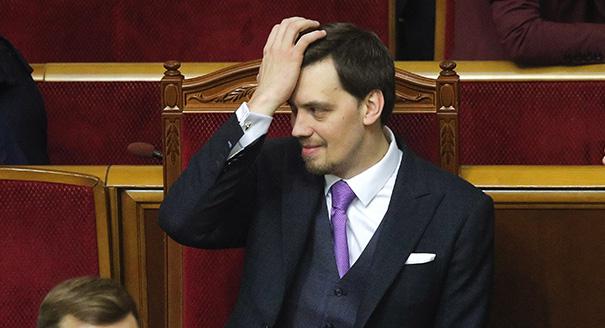The dismissal of the Ukrainian government this week signals the end of the honeymoon period of Volodymyr Zelensky’s presidency. The youngest cabinet in Ukrainian history lasted just six months. It looks as though the Ukrainian “deep state” represented by the country’s oligarchs has proved tougher and more enduring than the reformers had imagined. Yet in replacing his ministers in an attempt to combat his falling ratings, Zelensky may be forfeiting some of his own legitimacy, and risks joining the ranks of Ukraine’s failed reformers.
When Zelensky chose as his prime minister Oleksiy Honcharuk, a young lawyer with hardly any political or managerial experience, his thinking was obvious. Like the president, the prime minister should represent the new generation, be an idealist, and a professional in their own right.
Honcharuk’s government was intended to be technocratic and pro-Western, capable of soothing the fears of external creditors and attracting foreign investors. Honcharuk did make a good impression abroad, but at home he clashed with an influential enemy: the oligarch Ihor Kolomoisky. The government took a firm stance against reversing the nationalization of Kolomoisky’s former bank, Privatbank, and promptly came under fire from the oligarch’s media empire.
The government launched a further attack on Kolomoisky’s interests when Honcharuk tried to change the Kolomoisky-controlled management at a major state enterprise, Centrenergo, ahead of its privatization. Kolomoisky’s people responded by blocking access to the company for the new managers. Amid this battle, Honcharuk’s dismissal will cause significant damage to Zelensky’s image in the West. The president’s ties to Kolomoisky have long been controversial.
Officially, Zelensky had plenty of reasons to be displeased with his government: industrial production was down 5 percent from last year in January, there is a budget shortfall, and social problems have gotten worse. On the other hand, six months was clearly not enough time for the government to achieve any kind of breakthrough, especially given the unfavorable global situation and coronavirus epidemic.
It’s more likely that what sealed the fate of Honcharuk and his team was the fall in the president’s ratings: from 64 percent in November 2019 to 44 percent in February 2020, according to the Kiev International Institute of Sociology. The government had begun to drag down the president’s ratings, and he moved swiftly to get rid of it.
“Honcharuk’s government is not a bad one, but it has failed at everything it has attempted,” Zelensky told the Ukrainian parliament. He could easily have given the same judgment of himself.
Having used his parliamentary majority to get rid of his cabinet, Zelensky found himself facing a staffing crisis. As he saw it, his faith in young reformers had not been repaid, while he had distanced himself from professionals in his predecessor Petro Poroshenko’s team for obvious ideological reasons.
As a result, the new faces from the cabinet are being replaced by half-forgotten faces from the past. Finance Minister Ihor Umansky previously worked under president Viktor Yushchenko, while Healthcare Minister Ilya Yemets and Social Policy Minister Maryna Lazebna both served under president Viktor Yanukovych.
It’s a sign of the times that some of the ministerial posts were not filled right away, including the important position of energy minister. No worthy candidates could be found who were willing to become part of a government under a president so preoccupied with his ratings.
In feverishly reshuffling the government, Zelensky is trying to find a new formula for the perfect team. The oligarchs could always offer a helping hand in this respect. During the years of the oligarchic model of Ukrainian capitalism competent staff have been in demand among all the country’s main financial and industrial groups.
The most obvious example of that is the new prime minister, Denys Shmygal, who made a name for himself at the DTEK energy corporation of oligarch Rinat Akhmetov. In 2019, Shmygal was appointed governor of the Ivano-Frankivsk region, and in February 2020, he joined the government as a deputy prime minister. Although Shmygal says he has only ever seen Akhmetov on television, it’s clear that his appointment is a compromise move by Zelensky to appease the oligarchs.
Similarly, Regional Development Minister Oleksiy Chernyshov is an appointment lobbied for by none other than Kolomoisky. And one minister who survived the reshuffle and made it into the new cabinet—Interior Minister Arsen Avakov—is another Kolomoisky ally. Avakov has gone from being a temporary minister (he was inherited from the previous regime for what Zelensky initially said would be a six-month period) to a key untouchable player in the security bloc.
According to Ukrainian media, Shmygal is an apolitical technocrat who will not cross the president. Yet Zelensky’s fixation with professional and personal loyalty is beginning to impact on his capacity to rule. Whether or not the criticism was justified, Honcharuk’s cabinet had embodied the public feeling that saw Zelensky himself sweep to power: that it was better to have young and inexperienced people in government than experienced—but corrupt—statesmen.
With the fall of the government, the president loses some of his own legitimacy. After all, if that young team was so incapable of reforming the country, where is the guarantee that the equally young and inexperienced president can do any better?
The potential transformation of Zelensky into yet another failed Ukrainian reformer is fatally at odds with his entire mythology of the country’s relaunch. The dismissal of Honcharuk’s government isn’t just a triumph for the Ukrainian deep state and obdurate oligarchy. It’s also a Pyrrhic victory for the immature Ukrainian society. People still expect immediate miracles and messianic accomplishments from their elected leaders and President Zelensky is still trying to meet those expectations.
